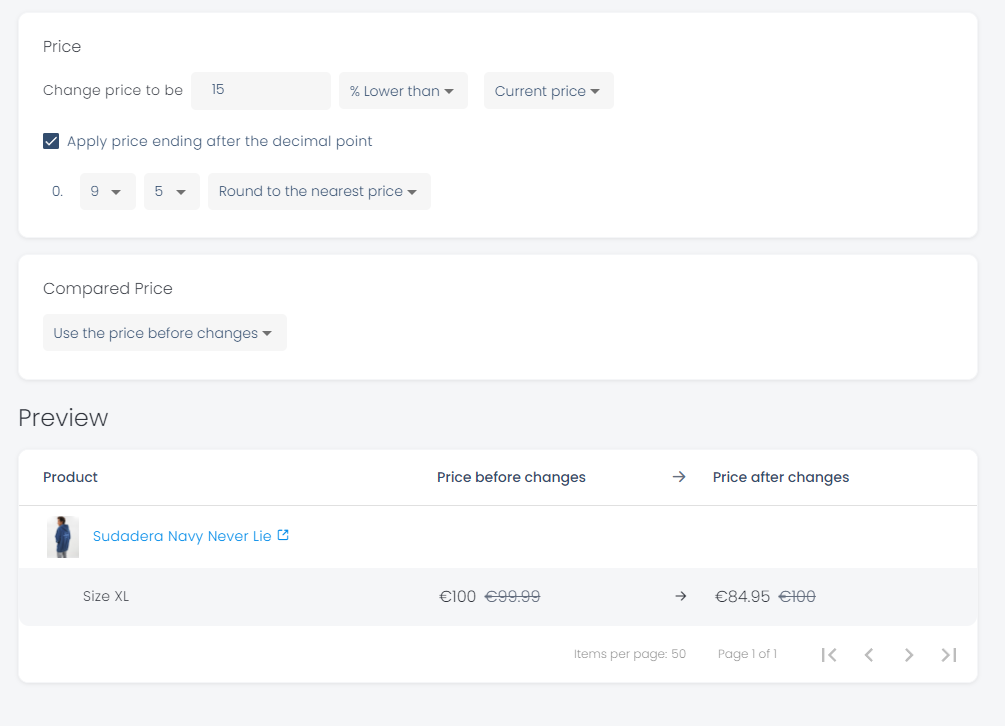This week on Planet's blog we talked about a pricing strategy to achieve more conversions: psychological pricing.
In this article, we will see what psychological pricing is, what psychological pricing strategies we can include in our eCommerce and how to automate price rounding with Planet.
What does psychological pricing mean?
Psychological pricing is part of a type of pricing strategy based on the theory that there are prices that attract customers' attention and influence their predisposition to buy. In other words, there are psychological factors that alter the perception of prices.
In this way, by slightly varying the price of your products you can have a greater impact on your customers and increase conversions.
Odd-Even Pricing strategy
The odd-even price strategy consists of putting prices ending in odd numbers, usually 5 and 9.
The reason for ending the prices of your products in odd numbers is that they attract more attention from customers, being perceived as a discounted price.
Customers do not make calculations when they buy a product, so if your product has a value of 10.75€, customers will perceive it to be closer to 10€ than 11€.
The 9 factor strategy
Odd-even price strategy is one of the most popular, so it is common to see products with a price ending in 9 or 99 instead of whole numbers or decimals other than 9.
This happens because customers perceive prices ending in 9 as a lower price, even if the variation is only 1 cent as it happens with 10€ and 9.99€.
Round prices strategy
This strategy is used for products that want to be perceived as "quality products" and works in reverse to the previous strategies, i.e., whole prices are used so that the product does not appear to be discounted and therefore may be perceived as a lower quality product.
It's common to use this strategy in products of luxury brands, which want to give value to their products. This strategy is also used in products bought on a whim and impulsively.
The round pricing strategy is intended to make your customers see that they are making a "perfect purchase" by having a rounded price with no decimal places.
Typical pricing strategy
Daily consumption products must maintain their price since they are products that customers buy frequently and therefore know their specific value. These products are purchased regardless of the rounding of their price because they are products that are purchased routinely and no time is invested in the purchase decision.
If customers find a daily consumer product at a higher price, they will avoid buying it because they know that this is not its value.
On the other hand, if the price is lower it will generate distrust in their purchase, so the ideal for these products is to maintain their regular price.
Advantages of psychological pricing
One of the clear advantage of using psychological pricing is the increase in sales and turnover of an eCommerce because it attracts more attention from customers.
In addition, this type of strategy facilitates the decision-making process for customers and, if the price of the products to implement the strategy is slightly reduced (from €11 to €9.99), the investment that will be obtained later thanks to the increase in sales will compensate for this price reduction.
Disadvantages of psychological pricing
The main disadvantage of using psychological pricing is that consumers may perceive this strategy as deception or manipulation, so it may negatively affect your brand's reputation.
This sensation of deception occurs especially when the label shows the whole number in a larger size and the decimals are shown in a reduced size, which makes them go out of sight to the naked eye and generates the sensation of deception.
How to round up the price of your discounted products on Shopify?
To round up the price of your Shopify eCommerce products when discounting them, you can use Planet and configure the "rounding" option as shown below.

In this way, in addition to applying the discount strategy in your eCommerce, you will increase your sales through the psychological pricing strategy.

